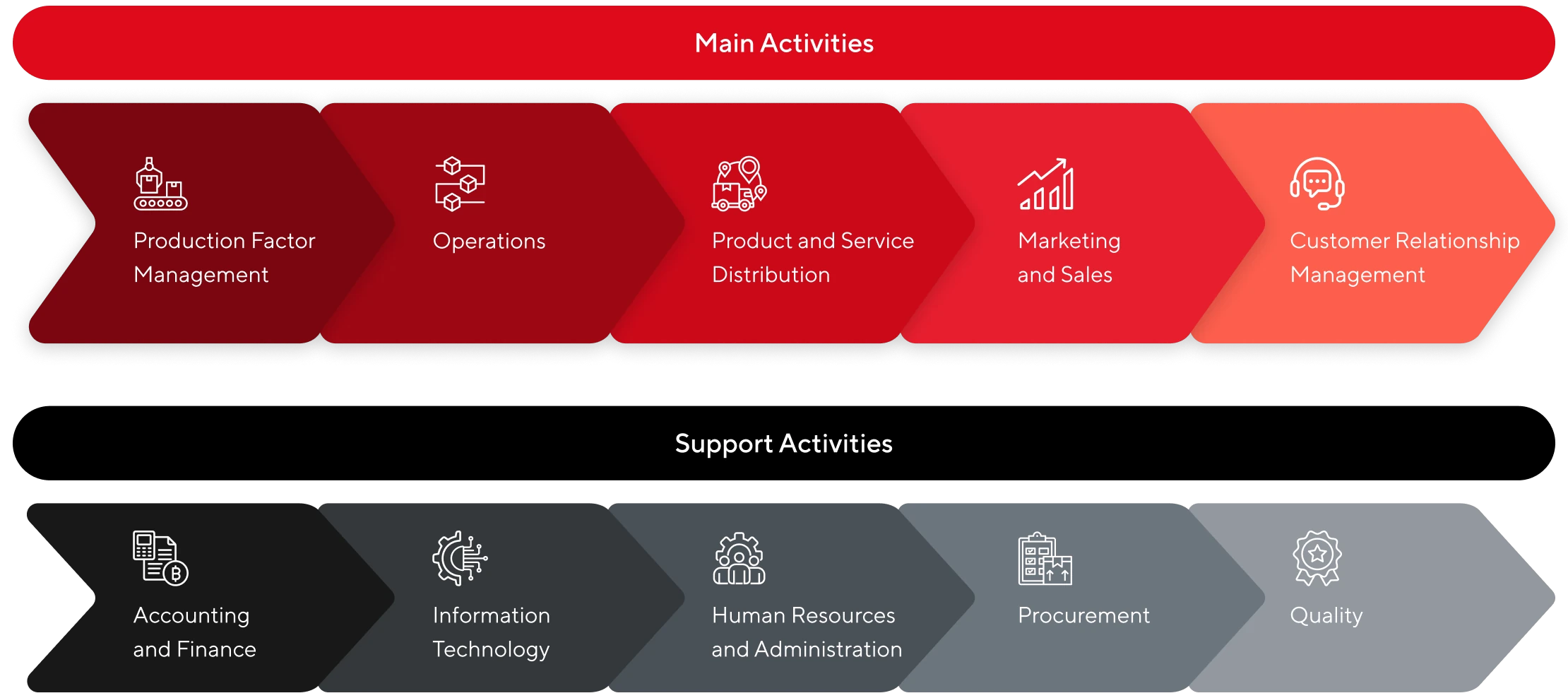
Value Chain and Stakeholder Engagement
Value Chain Engagement
The company prioritizes all stakeholders by carefully considering the impacts and benefits across the entire business value chain in every operational process. This includes sourcing raw materials, inspecting and storing them, preparing raw materials and producing products, distributing materials and products, preparing and cooking raw materials, and providing customer service. These efforts also extend to all internal operations, with the goal of ensuring that the company conducts our business transparently and fairly for all stakeholders.
Stakeholder Engagement
Internal Stakeholders
Engagement Channels:
- Providing information to shareholders.
- Responding to inquiries through the company’s public relations department.
- Publishing information on the company website.
- Holding the Annual General Meeting of Shareholders (AGM).
- Inviting investors to visit company operations.
Shareholder Expectations
- Return on Investment
- Good Corporate Governance, Audit Systems, and Effective Internal Controls.
- Business Growth and Sustainable Profitability.
- Competent of Directors and Executives with Appropriate Qualifications.
- Fair Treatment of All Shareholders.
- Comprehensive Disclosure of Material Information to All Shareholders.
- Dividend Payments When the Company is in a position to do so.
Responding to Shareholder Expectations
- Develop an annual business plan and disclose it at the Annual General Meeting of Shareholders.
- Establish the Board of Directors' Charter, which defines the qualifications and competencies of individuals appointed as directors.
- Prepare a skills matrix for executives to enhance workforce management and improve the efficiency of directors and executives.
- Implement a Good Corporate Governance Policy to ensure competitiveness in both the short and long term, while building confidence to increase shareholder value.
- Disclose financial statements and key information to shareholders accurately and promptly.
- Establish a dividend policy to ensure shareholders receive appropriate dividend payments.

Internal Stakeholders
Engagement Channels:
- Establishing complaint or whistleblowing channels.
- Providing suggestion boxes for feedback and recommendations.
- Facilitating communication between the Human Resources department and employees across all departments.
- Conducting employee satisfaction surveys.
- Organizing annual employee meetings.
Employee Expectations
- Fair working processes for all employees.
- Appropriate compensation and benefits aligned with performance.
- Career advancement opportunities.
- Development of skills, knowledge, and capabilities.
- Focus on safety, hygiene, and physical and mental health, along with providing a suitable working environment.
- Provision of adequate and well-maintained work equipment.
- Company stability.
- Respect for human rights and fair treatment of all employees.
Responding to Shareholder Expectations
- Develop and implement Human Resource Management policies, covering occupational health and safety, performance evaluation, employee development, compensation and benefits, and human rights.
- Create an operations manual outlining the organizational structure, job descriptions, work processes, and key performance indicators to standardize workflows and performance evaluations across the organization.
- Ensure appointments, transfers, rewards, and disciplinary actions are conducted equitably, with integrity, and based on knowledge, abilities, and individual performance.
- Provide continuous training and skill development programs for employees.
- Establish a Succession Plan to prepare for career growth in key positions.
- Conduct benchmarking studies to compare compensation and benefits with similar businesses.
- Implement employee satisfaction and workplace happiness surveys, along with complaint and whistleblowing channels.

External Stakeholders
Engagement Channels:
- Conducting customer satisfaction surveys.
- Providing channels for complaints and suggestions.
- Responding to requests for information disclosure.
- Establishing written agreements between parties.
Customer Expectations
- Standards, quality, and safety of raw materials, products, and services.
- Accurate information about products and services.
- Prompt and undamaged delivery of goods.
- Fair and reasonable pricing of products and services.
- Fair, transparent, and socially and environmentally responsible treatment of all customers.
- Protection of customer confidentiality and data.
Responding to Shareholder Expectations
- Select and verify high-quality, safe raw material sources that meet company standards.
- Inspect and control food preparation quality at every stage, as well as maintain cleanliness in central kitchens, ensuring food and services meet quality, nutritional, and hygiene standards.
- Develop products based on customer satisfaction and needs.
- Establish effective systems, channels, and responses for customer complaints, while implementing appropriate measures to safeguard customer confidentiality.

External Stakeholders
Engagement Channels:
- Providing channels for complaints and suggestions.
- Responding to requests for information disclosure.
- Establishing written agreements between parties.
Partner Expectation
- Fair and transparent procurement processes and conditions for all partners.
- Ability to fulfill contracts, including payments and related terms.
- Creating shared business value and benefits to establish long-term business partnerships.
- Safeguarding partner confidentiality and information.
Responding to Shareholder Expectations
- Adhere to procurement processes and contract terms with integrity, transparency, and fairness for all parties.
- Implement a Good Corporate Governance Policy to guide business operations, considering impacts while creating value for all stakeholders.
- Establish appropriate measures to safeguard partner confidentiality and information.

External Stakeholders
Engagement Channels:
- Publishing information on the company’s website.
- Providing channels for complaints.
- Organizing community engagement activities.
- Preparing annual reports and sustainability reports.
Expectations of Stakeholders
- Conduct business operations with consideration for potential impacts on society and nearby communities.
- Create jobs and promote careers within the community.
- Improve the quality of life and hygiene for communities involved in the supply chain.
- Promote environmental initiatives and maintain environmental care for the community.
Responding to Shareholder Expectations
- Develop a Corporate Social Responsibility (CSR) Policy to ensure sustainable business operations that consider environmental impacts.
- Support employment in nearby communities to distribute income and strengthen local economies.
- Comply with environmental laws and regulations set by relevant authorities.
- Improve resource efficiency and minimize pollution impacts.
- Establish systems, channels, and effective responses to community complaints related to potential operational impacts.
- Implement social projects and activities to support underprivileged individuals, assist those affected by natural disasters, and promote community well-being.











